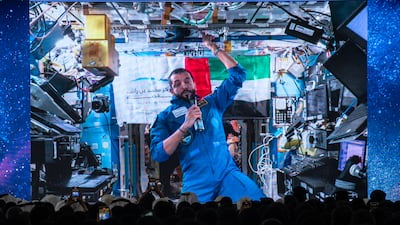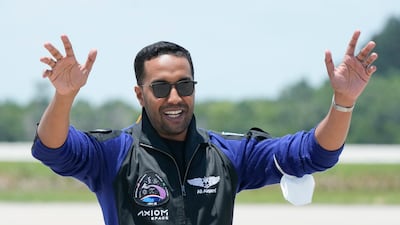Arab countries have been busy with a rush of space activities in the past few years.
Emirati and Saudi astronauts have joined forces in orbit, Oman is possibly building the Middle East's first spaceport and Kuwait and Bahrain are developing nanosatellites.
But Arab space agencies hope that these are only the first steps in what is expected to be a long-term space exploration programme by the region.
The UAE and Saudi Arabia have ambitious plans to send astronauts to the Moon and beyond in the future, while smaller Arab nations such as Kuwait and Bahrain are developing satellite programmes to inspire their citizens into Stem fields.
“There are a lot of emerging space countries that are now taking active steps to be participants and introduce their space sector globally,” Mishaal Ashemimry, special adviser to the chief executive of the Saudi Space Commission, told The National in an interview on Tuesday.
“Certainly in the region you’re seeing an increasing trend of interest in participation in the space economy.
“I believe in the next few years the efforts and missions are going to increase, and the contributions are going to increase tremendously.”
The effect of space exploration on the region’s education sector is already showing, with more school pupils and university students getting involved in research.
Dimitra Atri, a space scientist at New York University Abu Dhabi, said his students are involved in research based on observations of Mars being made by the UAE’s Hope probe.
“Local universities, including NYUAD, offer a variety of research prospects for students,” he told The National.
“My group has a new opportunity this year, which is for training UAE nationals in space research.”
Dr Atri added that while some students have already entered the aerospace and defence sector in the UAE, others have pursued research positions and higher education abroad.
“Recent graduates of my group who worked with Hope data were offered positions at Oxford and Cambridge, which is very exciting,” he said.
More long-duration space missions
The UAE sent the first Arab astronaut, Sultan Al Neyadi, on a long-duration space mission with the help of Axiom Space, a Houston company that helps arrange trips to the International Space Station (ISS).
But the mission was also possible because Dr Al Neyadi graduated from a Nasa programme that allows him to be part of agency-led missions.
The UAE’s other astronauts, Hazza Al Mansouri, the first Emirati in space, Nora Al Matrousi and Mohammed Al Mulla, are also eligible for Nasa-led missions.
Saudi Arabia sent its first two astronauts to the orbiting outpost on May 22 for an eight-day stay as part of a private trip by Axiom Space.
But the kingdom hopes to send citizens into space for long-term stays.
“We do have a desire and a goal to have long-stay missions that will capitalise on that microgravity environment,” Ms Ashemimry said on April 6.
“That's essentially what we would like to do with this human space flight programme."
Countries like Saudi Arabia would benefit from commercial space stations, because they would be able to pay to send their astronauts for long stays.
Only partners of the space station – the US, Russia, Japan, European Space Agency and Canada – are currently eligible for six-month missions to the ISS.
The UAE became the first non-partner country to send an astronaut on a long-duration mission.
These lengthy stays on the ISS help prepare astronauts for missions to the Moon and Mars, as well as carry out research in microgravity for scientists on Earth.
Going to the Moon and Mars
The UAE, Saudi Arabia and Bahrain have expressed interest in exploring the Moon and Mars, having signed the US-led Artemis Accords.
The international agreement outlines responsible exploration of space, including regions beyond low-Earth orbit.
"The Artemis programme is pretty big. Whether you contribute through technology or astronauts, it's a big programme," Ms Ashemimry told The National.
"So, determining the exact technology that you're going to be developing to benefit all the Artemis Accords signatories and participating with astronauts – I think all that is open for us to do, for sure."
Only Nasa's Space Launch System and Orion spacecraft can currently fly to the Moon, with an uncrewed test flight and lunar orbit completed last year.
SpaceX is developing its Starship rocket for deep-space missions.
Nasa and its international partners are developing the Lunar Gateway, a small station in the Moon's orbit in which astronauts will live before descending to the surface.
Nasa has contracted SpaceX and Blue Origin to develop landers for the Artemis programme that will allow astronauts to touch down on the lunar surface .
Increasing exploratory missions
With a probe already orbiting Mars, the UAE is hoping to increase the number of exploration missions.
Its next big mission involves a spacecraft that will explore seven asteroids in the main asteroid belt, a region between Mars and Jupiter.
This project is expected to help pave the way for the local private space sector, with more than 50 per cent of the mission to be developed by local companies.
It is expected that involving UAE-based companies will contribute to the national economy.
Once the Emirates has an established private space sector, companies would then be competing for contracts from government-run agencies such as the Mohammed bin Rashid Space Centre and the UAE Space Agency.
This demand could increase the cadence of exploration missions, ultimately helping the overall space sector in the UAE grow significantly.







